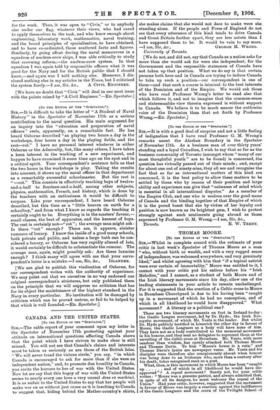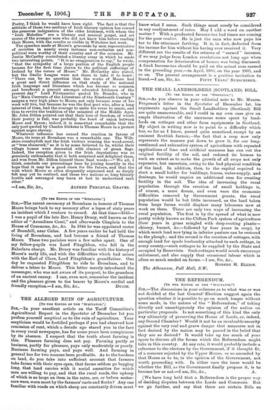THOMAS MOORE.
[To THE EDITOR OF THE "SPECTATOR,"] SIR,—Whilst in complete accord with the estimate of your critic in last week's Spectator of Thomas Moore as a man "who, without birth or wealth, and with a very rugged sense of independence, was welcomed everywhere, and very genuinely liked," and whilst agreeing with him that "if a topical satirist were ever certain of immortality," Moore was entitled to it, I cannot with your critic put his satires before his "Irish Melodies," and I cannot, as a student of both Moore and of the Irish literary movements since his day, allow one of the leading statements in your article to remain unchallenged. For it is suggested that the erection of a Celtic cross to Moore in Bromham Churchyard is due to his having been "caught up in a movement of which he had no conception, and of which in all likelihood he would have disapproved." What movement ? A literary or a political one ?
There are two literary movements on foot in Ireland to-day : the Gaelic League movement, led by Dr. Hyde ; the Irish Neo- mystic movement, of which Mr. Yeats is the leader. But whilst Dr. Hyde publicly testified in Limerick the other day in favour of Moore, the Gaelic Leaguers as a body will have none of him. They have not as a body contributed to the memorial movement in his honour, and they sent no delegates to represent them at the unveiling of the Celtic cross at Bromham. Mr. Yeats, with more candour than wisdom, has openly attacked both Thomas Moore and Thomas Davis. To him " Moore's house is a ruin," and Thomas Davis's lyrics are newspaper verse. Mr. Yeats and his disciples were therefore also conspicuously absent when honour was being done to an Irishman who, more than a century after his death, takes recognised rank as a poet.
What, then, is this movement in which Moore has been "caught
up and of which in all likelihood he would have dis- approved " ? A repeal movement? Surely not, for your critic writes : "Moore was a genuine patriot, and always admitted that, in spite of all its dangers, he must welcome the repeal of the Union." Had your critic, however, suggested that the movement in favour of Moore was largely a reaction against the indifference of the Gaelic Leaguers and the scorn of the Twilight School of
Poetry, I think he would have been right. The fact is that the attitude of these two sections of Irish literary opinion has roused the generous indignation of the older Irishmen, with whom the "Irish Melodies' are a literary and musical gospel, and set scores of the younger men who did not know him before reading their Moore, with the results so visible in Wiltshire last week.
The speeches made at hfoore's graveside by men representative of societies in nearly every instance non-sectarian and non- political were worthy of their country and of the occasion. Mr. Justin McCarthy contributed a literary essay in which he made two interesting points. "It is no exaggeration to say," he wrote, "that the sympathy of a large portion of the English people became for the first time drawn to the political sufferings of Ireland by the verses of Moore." Mr. McCarthy also stated, but the Gaelic League were not there to take it to heart : " There can be no question that the works of Moore had a great and direct influence on that study of the national. Irish language and literature which has become so common and beneficent a pursuit amongst educated Irishmen of the present day." Lord Pitzmaurice quoted Dr. Brandes, who in his "Main Currents of the Literature of the Nineteenth Century" assigns a very high place to Moore, not only because some of his work will live, but because he was the first poet who, after a long interval of time, had the courage to unite his verse to music, and thus to revive the tradition of the minstrel of the Middle Ages. Mr. John Dillon pointed out that their love of freedom, of which their poetry is full, was probably the bond of union between Moore and Byron; indeed, it is somewhat remarkable that the only poet quoted by Charles Dickens is Thomas Moore in a protest against negro slavery. Whatever influence has caused the reaction in favour of Moore, its issue at Bromham was a remarkable one. The Wilt- shire countryfolk met the Irish visitors wearing the wood-sorrel, or "true shamrock," as it is by some believed to be, whilst their village homes were decorated with clusters of green flags. Indeed, the reception given to the Irish deputations was so genuinely enthusiastic that it both surprised and delighted them, and won from Mr. Dillon himself these final words :—" We all, I think, conclude our proceedings here by joining heartily in the hope that it may be a good omen for the future, and that the wish which Moore so often eloquently expressed and so deeply felt may yet be realised, and these two nations so long bitterly hostile and estranged may learn at last to understand each other."
—I am, Sir, dtc., ALFRED PERCEVA.L GRAVES.



























































 Previous page
Previous page